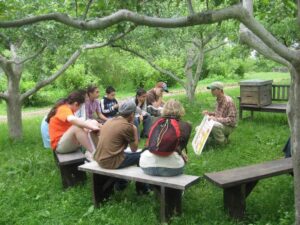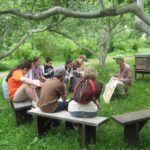 The Jewish people have had food at the forefront of our consciousness for over 3,000 years. Whether we were determining if something is “fit” to eat (kosher), gathering around the seder table to recall and recreate our history, or noshing and schmoozing at kiddush, food has been and will remain a centerpiece of our communities.
The Jewish people have had food at the forefront of our consciousness for over 3,000 years. Whether we were determining if something is “fit” to eat (kosher), gathering around the seder table to recall and recreate our history, or noshing and schmoozing at kiddush, food has been and will remain a centerpiece of our communities.
Because of this, whether we realize it or not, what we call “Jewish Food Education” is an important part of any Jewish education experience. Go into any Jewish religious school, camp, or after-school program and you will inevitably find students and teachers talking about food many times throughout the year. Many of you make challah or matzah or hamentashen with your classes. The conversation about food is central to the Jewish experience, and as we continue to eat Jewishly (however that is defined), we knowingly and unknowingly pass on traditions. Yet how do we understand these traditions in our own context? How can we find meaning and re-invigorate tradition in the modern world? And how can we do all of this in a way that excites and engages our students?
Tu B’Shvat is just around the corner, and our new year for the trees is the perfect time to have these kinds of conversations. Sustaining and protecting our world is a key lesson of Tu B’Shvat, and we can teach that through food. Just take the story of Honi the circle maker (Ta’anit 23a). He saw someone planting carob seeds and wondered why. Since carobs trees take 70 years to grow and fruit, the man would never be able to enjoy the fruit of his labor. The man responds to Honi that although he will not be able to eat this carob, his children and grandchildren will, and if his parents and grandparents hadn’t planted trees for him, he never would have been able to eat carob himself. This simple story gets at the core idea of sustainability. Living in such a way that our children and their children will be able to live and enjoy the fruit of the earth. For younger children, you could tell the story (or screen the G-Dcast Tu B’Shvat episode) and then plant seeds or make sprouts. Older students might be more interested in learning the story and discussing how it applies to their lives. Even though we don’t often plant our own food today, what could it symbolize in their lives? What choices can they make to make sure that the world is healthy for future generations? Have your teens write postcards to themselves, making commitments for the future, and then mail them after Pesach so they can be reminded.
The Jewish Food Education Network (JFEN) is one way that Hazon provides food education resources. Hazon’s Min Ha’Aretz curriculum for 5th-9th graders and Food For Thought sourcebook are invaluable resources that will help you to facilitate these conversations with your students. JFEN also provides you with a community of like-minded educators around the country. Our online interactive program bank, periodic network conference calls, and annual in-person training at the Hazon Food Conference give you the opportunity to meet and work with educators from around the country and across the spectrum of Jewish experience. You can share ideas, successes, and challenges, and work together to enable your students to live healthier and more sustainable lives.
Daniel Infeld is the Institutional Advancement Associate and manages the Jewish Food Education Network (JFEN) for Hazon. You can contact him at daniel.infeld@hazon.org or visit hazon.org/JFEN for more information.
